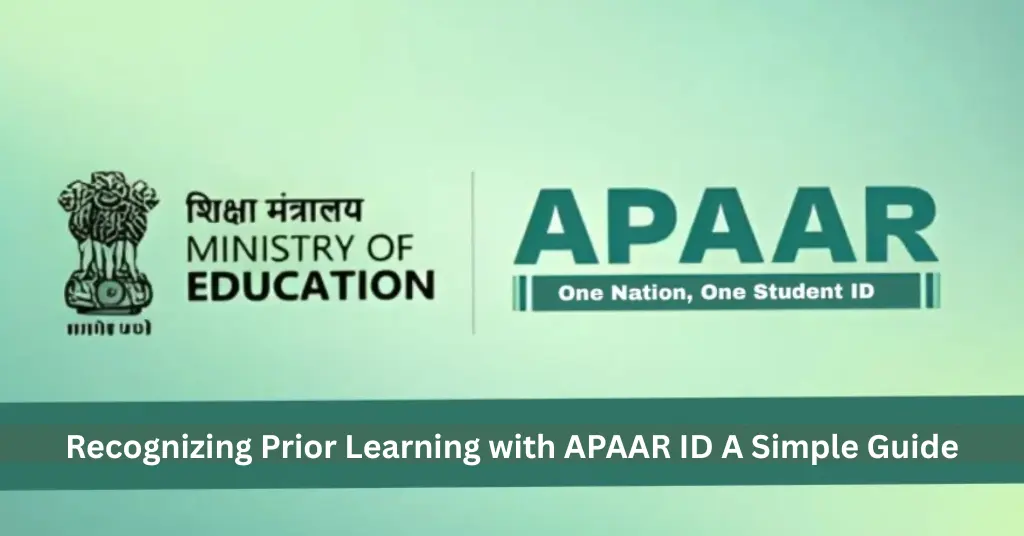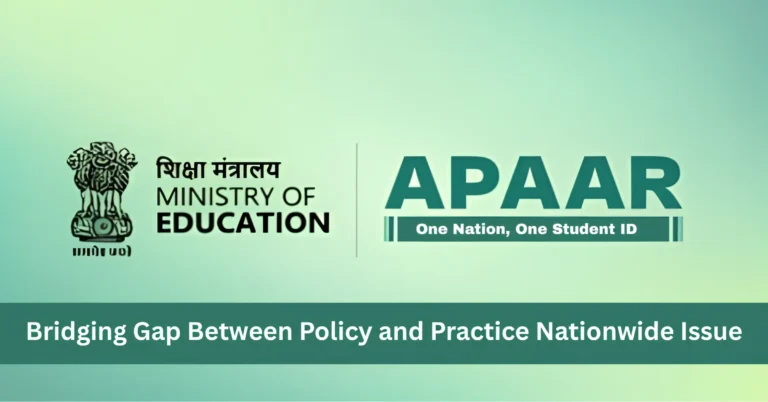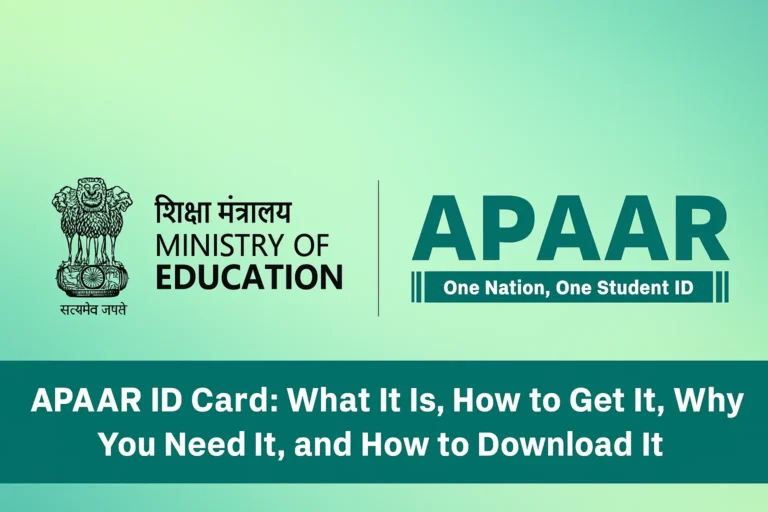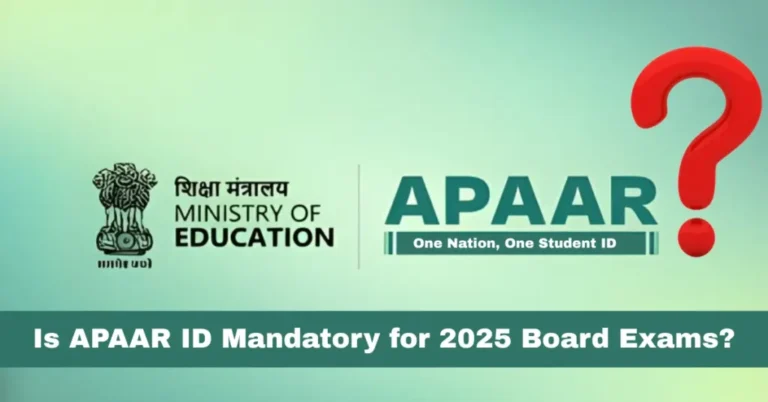Recognizing Prior Learning with APAAR ID: A Simple Guide
India’s education system is transforming through digital innovation and inclusivity. With the launch of the APAAR ID (Automated Permanent Academic Account Registry), the recognition of prior learning has become more transparent, structured, and equitable. This initiative allows individuals to record and validate their previous academic, professional, and skill-based experiences under a unified digital identity.
By bridging formal and informal education, APAAR empowers learners of all backgrounds to receive acknowledgment for their accumulated knowledge, fostering lifelong learning and career mobility.

Understanding Prior Learning Recognition (RPL)
Recognition of Prior Learning (RPL) is a systematic process of evaluating and accrediting knowledge, skills, and competencies acquired outside the traditional classroom setting. These may come from work experience, vocational training, community engagement, or self-learning.
With APAAR integration, RPL is digitized — ensuring transparency, reliability, and uniformity in assessment and certification.
APAAR ID: A Foundation for Lifelong Learning
The APAAR ID, introduced under the National Education Policy (NEP) 2020, acts as a lifelong digital academic identity that stores verified educational records in the Academic Bank of Credits (ABC). It facilitates recognition of diverse learning pathways and enables learners to redeem credits for formal qualifications.
This digital registry supports the government’s goal of bridging formal, non-formal, and informal learning systems into one integrated framework.
Objectives of Recognizing Prior Learning through APAAR
The recognition of prior learning via APAAR seeks to:
This initiative ensures that learning, regardless of where or how it occurs, receives formal acknowledgment.
How APAAR Facilitates Recognition of Prior Learning
APAAR serves as a digital evidence repository, enabling educational institutions, skill councils, and employers to verify previously acquired skills and qualifications.
Key features include:
Through this mechanism, RPL becomes credible, traceable, and universally accessible.
Integration with the Academic Bank of Credits (ABC)
The Academic Bank of Credits plays a crucial role in supporting RPL by storing verified credits from various formal and informal learning activities. Learners can use their APAAR ID to access and manage these credits, making it possible to redeem them toward degrees or diplomas at recognized institutions.
This flexibility aligns with NEP 2020’s vision of multidisciplinary and lifelong education.
Recognizing Non-Formal and Informal Learning
APAAR’s framework extends beyond conventional academic achievements. It records and validates community learning, workplace training, and self-acquired competencies. This inclusion ensures that individuals with rich experiential knowledge can have their skills officially recognized, fostering career progression and self-worth.
Advantages of Recognizing Prior Learning via APAAR
Fair Recognition: Every learner receives due acknowledgment for their competencies.
Career Advancement: Verified learning outcomes improve job eligibility.
Access to Formal Education: Learners can transition smoothly into degree programs.
Reduced Duplication: Avoids repeating courses or training already mastered.
Increased Employability: Employers can trust verified skill records stored digitally.
The Role of Institutions in RPL Implementation
Educational institutions and skill councils are vital stakeholders in implementing RPL through APAAR. Their roles include:
This coordinated approach ensures uniform recognition and transparency across all educational levels.
Aligning with the National Education Policy (NEP 2020)
The NEP 2020 emphasizes flexibility, inclusion, and lifelong learning, and APAAR fulfills these objectives by institutionalizing prior learning recognition. The policy encourages multi-entry and multi-exit systems, credit transfers, and vocational-academic integration—all of which rely on APAAR’s digital infrastructure.
Linking Skill India and APAAR for Seamless RPL
APAAR’s integration with the Skill India Mission ensures that vocational skills assessed under RPL programs are digitally recorded and recognized. This partnership bridges the divide between skill development and higher education, promoting industry-ready talent and workplace validation.
Data Security and Ethical Standards
The APAAR system upholds strict data security, privacy, and consent-based sharing principles. All records are encrypted and can only be accessed with the learner’s permission. This ensures that prior learning data is used responsibly, maintaining ethical governance and data integrity.
Building an Inclusive Learning Ecosystem
Recognizing prior learning is key to building an inclusive education ecosystem. APAAR ensures that marginalized groups, informal sector workers, and adult learners gain recognition for their knowledge, paving the way for equitable access to education and employment.
Employer Benefits from APAAR-based RPL
For employers, APAAR-based recognition provides access to verified data on an individual’s competencies and learning achievements. This helps in:
Enhancing Global Recognition of Indian Credentials
APAAR’s standardized and verifiable digital framework contributes to global recognition of Indian qualifications. This facilitates international mobility for professionals, as prior learning and credits can be authenticated across borders through verified digital credentials.
Addressing Implementation Challenges
Implementing RPL via APAAR requires addressing challenges such as limited awareness, digital accessibility, and institutional preparedness. The government’s focus on capacity building, training workshops, and digital literacy is helping to ensure smooth nationwide adoption.
The Future of Learning Recognition in India
The evolution of APAAR will likely incorporate artificial intelligence and data analytics to recommend learning pathways and validate prior experience more efficiently. In the future, learners may receive automated equivalency suggestions, aligning prior skills with academic or professional qualifications.
Promoting Lifelong Learning and Upskilling
By validating all forms of learning, APAAR encourages individuals to continually upgrade their skills. This recognition motivates people to pursue new training opportunities, fostering a culture of lifelong learning essential for the dynamic global economy.
Collaboration Among Stakeholders
Effective recognition of prior learning requires cooperation between:
Frequently Asked Questions (FAQs)
1. What is Recognition of Prior Learning (RPL)?
RPL is the formal acknowledgment of skills and knowledge acquired through non-formal or informal learning, validated against recognized standards.
2. How does APAAR support RPL?
APAAR digitally records and verifies prior learning achievements, making them officially recognized and accessible for educational or employment purposes.
3. Can work experience be recognized under APAAR’s RPL framework?
Yes. Relevant work experience, training, and informal learning can be validated and credited under the APAAR system.
4. Is RPL available for all levels of education?
APAAR enables RPL across multiple education levels — from vocational to higher education — ensuring nationwide inclusivity.
5. How secure is the data stored under APAAR?
All data is encrypted, user-controlled, and protected under strict privacy protocols to maintain confidentiality and trust.
Final Thoughts
The APAAR ID represents a monumental leap in India’s educational reform, enabling a transparent, inclusive, and lifelong system of learning recognition. Through the integration of Recognition of Prior Learning (RPL), APAAR bridges the gap between formal education and real-world experience, ensuring that every skill and achievement is valued.
As India advances toward a digital education era, APAAR redefines learning equity — celebrating knowledge gained in classrooms, workplaces, and communities alike. It not only honors individual growth but also strengthens the nation’s human capital, promoting a future-ready, skilled, and inclusive India.





